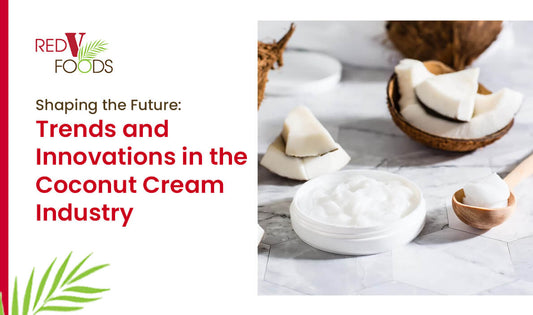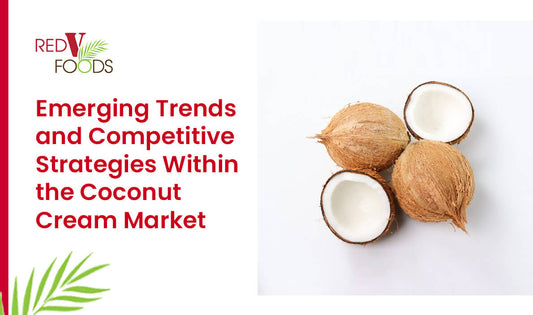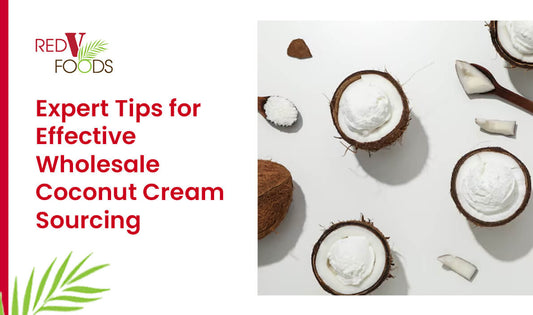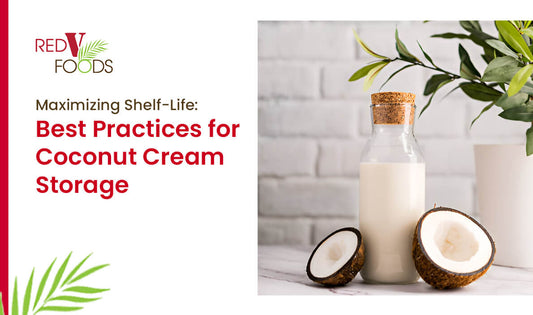🚨 TARIFF ALERT 🚨
Effective Aug. 7, 2025 a 19–20% U.S. import tariff will be applied to all affected products. Red V Foods Corp is required to pass this fee through, and it will appear as a separate Tariff line item on all customer invoices.
$0.00 USD
Effective Aug. 7, 2025 a 19–20% U.S. import tariff will be applied to all affected products. Red V Foods Corp is required to pass this fee through, and it will appear as a separate Tariff line item on all customer invoices.

Using the right ingredients is crucial to offering delicious food products that’ll make customers want to keep coming to your business. If you’re looking for a new holy grail ingredient that can enhance your offerings, try coconut! It’s versatile, fits people with specific diet requirements, and can be used in savory dishes and delectable pastries.
Sweetened shaved coconut flakes, in particular, are a star ingredient you can play with to bring a tropical twist to your pastries, baked goods, and beverages. However, if it’s your first time trying sweetened coconut flakes, you most probably have some questions about it.
Red V Foods is one of the USA’s leading distributors of premium coconut products. To help you, we made this article to answer common questions about sweetened coconut flakes. Hopefully, at the end of this blog, you’ll be more equipped and encouraged to use sweetened coconut flakes to enhance your food products. Read on!

Some, if not all, of these questions may provide the answers you’re looking for about sweetened coconut flakes. Check them out:
Yes, you can use sweetened coconut flakes instead of fresh coconut. However, while they’re more moist than unsweetened coconut, they are still drier compared to fresh coconut. What you can do is soak the sweetened coconut flakes in water or milk to help them soften and absorb moisture from the liquid. Doing this will also help reduce the sweetness of the coconut flakes.
Sweetened coconut flakes contain sugar. Sugar caramelizes because of heat, resulting in a dark brown color. This is something you should always remember when using sweetened coconut flakes as toppings or coating. To prevent browning, you can cover them with aluminum foil.
You can also mix the coconut flakes with batter or dough. If you still want to use them as topping, another option would be to add them after you’re done cooking cake, pie, or whatever pastry in the oven.
Desserts usually come to mind first when using sweetened coconut flakes, but you can definitely incorporate them in savory dishes, too! Mix them in with your salad for a refreshing taste of coconut and added sweetness. You can also add them to thicken curries and sauces or toss them in fried rice. They can even be used as breading for shrimp, chicken, or fish. Check out this sheet pan coconut shrimp recipe that uses sweetened coconut flakes for inspiration.
If unopened, they will remain in good quality for 6 to 12 months at normal temperature. Otherwise, they’re still good for around six months, as long as you store them properly in an airtight container and at room temperature. Keep in mind that hot and humid conditions can cause them to go bad quickly. Meanwhile, you can extend the shelf life of your sweetened coconut flakes by storing them in the fridge, but doing this will cause them to dry out and become brittle.
Look at their color. They should have a white or off-white color; otherwise, this could be a sign that your sweetened shaved coconut flakes are starting to go bad. If they have an off-putting odor, such as a stale or sour smell, it’s best not to use them. Lastly, if they’ve gone bad, they would most likely have an unpleasant taste.
Buying sweetened coconut flakes in bulk offers many benefits. Purchasing large quantities often leads to discounts. Plus, it also lessens the number of trips you would take to the store to purchase them. Additionally, buying in bulk benefits the environment because it typically involves using less packaging. However, this is only advisable if you heavily use sweetened coconut flakes in your business to prevent food wastage.
Yes, sweetened shaved coconut flakes don’t contain gluten, a protein found in flour, cereal, pasta, and crackers, among other products. This makes them a suitable ingredient for people who follow a gluten-free diet due to certain medical conditions such as celiac disease.
That being said, you still need to check the packaging of the sweetened coconut flakes you’re buying, as they may be processed in a facility that also processes gluten-containing products. You may also consider opting for organic sweetened coconut flakes to cater to your health-conscious customers.
Knowing how to use and incorporate sweetened shaved coconut flakes properly in your food products is just half of the task. You also need to find a trusted supplier of this ingredient, like Red V Foods!
We are a leading manufacturer of coconut products in the USA. Our sweetened coconut comes in various cuts – aside from flakes, we also offer shreds, chips, and medium and fine cuts, giving our customers multiple options for different purposes.
Our sweetened coconut products are all Kosher certified and come in natural, SO2-free, and custom formulations. Moreover, they’re available in retail, industrial, and food service quantities. Their shelf-life is 12 months, provided specific storage conditions are met.
What if you’re not residing in the USA? No problem! We ship our products to South and North America, including Canada, Chile, and Mexico, among other countries. For inquiries in Asia or Europe, please contact Axelum Resources Corp. at axelum@axelum.com.ph.
Sweetened shaved coconut flakes are easy to incorporate into savory delicacies and sugary treats. Once you know how to use and store them, you’ll be able to whip up mouthwatering products that’ll elevate your menu in no time.
Feel free to browse our website further to learn more about our offerings. You may also contact us if you have any questions or concerns!

The coconut cream industry is expanding with a 7.2% projected CAGR, driven by plant-based diets, health benefits, and versatile applications. ...
The coconut cream industry is expanding with a 7.2% projected CAGR, driven by plant-based diets, health benefits, and versatile applications. ...
Read More
The coconut cream market has seen significant growth, particularly in Southeast Asia, but North America is fastest-growing, with a projected...
The coconut cream market has seen significant growth, particularly in Southeast Asia, but North America is fastest-growing, with a projected...
Read More
Buying coconut cream in bulk offers significant cost savings, ensures consistent product quality, and reduces waste, making it ideal for...
Buying coconut cream in bulk offers significant cost savings, ensures consistent product quality, and reduces waste, making it ideal for...
Read More
Coconut cream, due to its high water and fat content, is highly susceptible to spoilage. Proper storage practices, including refrigeration...
Coconut cream, due to its high water and fat content, is highly susceptible to spoilage. Proper storage practices, including refrigeration...
Read MoreLife is better with coconuts! Reach out to learn more about how we can supply you with this tropical delight.